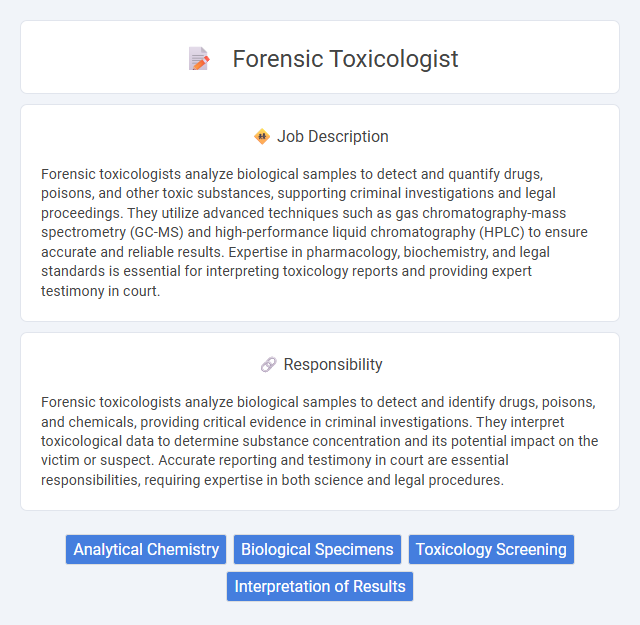
Forensic toxicologists analyze biological samples to detect and quantify drugs, poisons, and other toxic substances, supporting criminal investigations and legal proceedings. They utilize advanced techniques such as gas chromatography-mass spectrometry (GC-MS) and high-performance liquid chromatography (HPLC) to ensure accurate and reliable results. Expertise in pharmacology, biochemistry, and legal standards is essential for interpreting toxicology reports and providing expert testimony in court.
Individuals with strong analytical skills and a keen attention to detail are likely to be suitable for a forensic toxicologist role, given the job's demands for precise laboratory work and data interpretation. Those who handle stress well and maintain objectivity in high-pressure situations may find this career more manageable, as it often involves working with sensitive and sometimes distressing cases. People with a background or interest in chemistry, biology, or forensic science probably have a higher chance of thriving in this profession.
Qualification
Forensic toxicologists typically require a bachelor's degree in toxicology, chemistry, biology, or a related field, with many employers preferring candidates who hold a master's or doctoral degree for advanced expertise. Certification from professional bodies such as the American Board of Forensic Toxicology (ABFT) enhances credibility and job prospects. Strong knowledge of analytical techniques, instrumentation, and legal protocols is essential for accurate substance identification and interpretation in forensic investigations.
Responsibility
Forensic toxicologists analyze biological samples to detect and identify drugs, poisons, and chemicals, providing critical evidence in criminal investigations. They interpret toxicological data to determine substance concentration and its potential impact on the victim or suspect. Accurate reporting and testimony in court are essential responsibilities, requiring expertise in both science and legal procedures.
Benefit
Forensic toxicologists likely offer critical benefits by providing accurate analysis of biological samples to detect toxins, drugs, and poisons, supporting legal investigations. Their expertise probably aids in determining causes of death or impairment, which can influence judicial outcomes and public safety measures. Employing forensic toxicologists may enhance the reliability and credibility of forensic evidence presented in courts.
Challenge
Forensic toxicologists likely face the ongoing challenge of accurately detecting and interpreting trace levels of toxic substances in complex biological samples. The probability of encountering new and unexpected chemicals means constant updating of analytical techniques and knowledge. Maintaining precision under time-sensitive conditions is probably critical to support legal investigations effectively.
Career Advancement
Forensic toxicologists can advance their careers by gaining specialized certifications such as the American Board of Forensic Toxicology (ABFT) credential, which demonstrates expertise and enhances job prospects. Pursuing advanced degrees like a Master's or Ph.D. in toxicology or forensic science opens opportunities for higher-level positions in research, academia, or federal agencies. Leadership roles in crime laboratories or consulting positions for law enforcement also represent significant career progression pathways.
Key Terms
Analytical Chemistry
Forensic toxicologists specialize in analyzing biological samples to detect and quantify drugs, poisons, and chemicals using advanced analytical chemistry techniques such as gas chromatography-mass spectrometry (GC-MS) and liquid chromatography-tandem mass spectrometry (LC-MS/MS). They interpret complex data to determine substance presence, concentration, and potential biological effects, supporting legal investigations and criminal cases. Expertise in sample preparation, instrument calibration, and method validation is critical to ensure accurate, reliable results in forensic laboratories.
Biological Specimens
Forensic toxicologists analyze biological specimens such as blood, urine, and tissues to detect and quantify toxins, drugs, and other chemicals. These analyses provide crucial evidence in criminal investigations, enabling determination of cause of death, impairment, or poisoning. Expertise in interpreting toxicological data ensures accurate results for legal proceedings and forensic casework.
Toxicology Screening
Forensic toxicologists specialize in toxicology screening to detect and analyze drugs, poisons, and chemicals in biological samples collected from crime scenes or deceased individuals. They use advanced techniques such as gas chromatography-mass spectrometry (GC-MS) and liquid chromatography-tandem mass spectrometry (LC-MS/MS) to identify and quantify substances, providing critical evidence in criminal investigations and legal proceedings. Accurate interpretation of toxicology screening results helps determine cause of death, impairment, or intoxication, supporting law enforcement and judicial decision-making.
Interpretation of Results
Forensic toxicologists specialize in interpreting laboratory results to determine the presence and concentration of drugs, alcohol, poisons, and other toxic substances in biological samples. They utilize advanced analytical techniques such as gas chromatography-mass spectrometry (GC-MS) and liquid chromatography-tandem mass spectrometry (LC-MS/MS) to accurately quantify substances and assess their potential effects on individuals. Their expert interpretation aids legal investigations by providing crucial evidence regarding cause of death, impairment, or poisoning in criminal, civil, and workplace cases.
 kuljobs.com
kuljobs.com